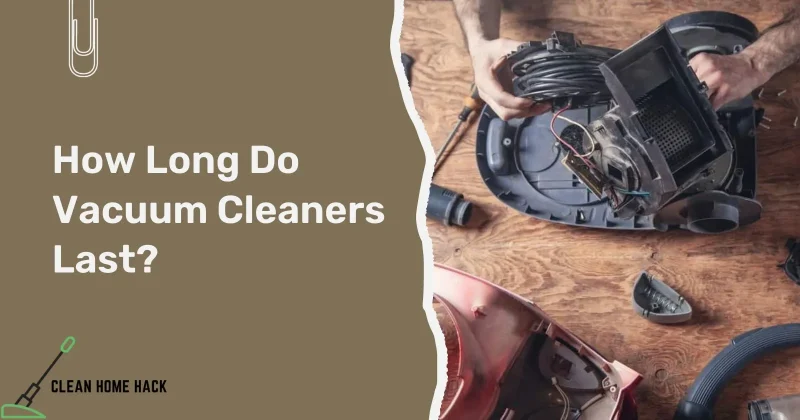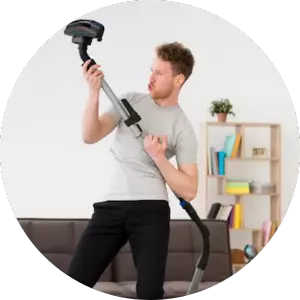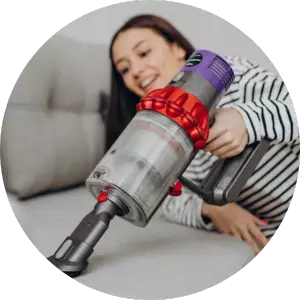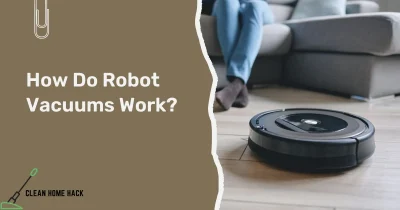How Long Do Vacuum Cleaners Last? 5 Factors Affecting Vacuum Longevity

 The Short Answer is: The Short Answer is: |
| Vacuum cleaners last a median of eight years. However, the lifespan of a vacuum cleaner can vary depending on factors such as usage, maintenance, and quality of the product. Some vacuum cleaners may last longer than eight years, while others may need to be replaced sooner. |
Vacuum cleaners are an essential tool for keeping your home clean, but how long do vacuum cleaners last? According to a reliability survey by Consumer Reports, the average lifespan of a vacuum cleaner is eight years.
However, this number varies widely by brand and how often you use it. If you have a small apartment and don’t use your vacuum cleaner frequently, it may last longer than eight years.
On the other hand, if you have a large home with pets and use your vacuum cleaner frequently, it may not last as long. In this article, we will discuss the topic, “How long should a vacuum last” the signs that indicate it’s time to replace your vacuum cleaner, and how to extend its lifespan.
Table of Contents
Factors Affecting Vacuum Cleaner Longevity
Vacuum cleaners are essential household appliances that require proper care and maintenance to last long. The average lifespan of a vacuum cleaner is about eight years, but some models can last up to 15 years, while others may fail in less than two years.
The following are factors that affect the longevity of a vacuum cleaner:
1. Quality of materials and construction
Vacuum cleaners made of durable and high-quality materials, such as metal, are likely to last longer than those made of plastic or low-quality components.
2. Frequency of use and maintenance
Vacuum cleaners that are used frequently and properly maintained, such as cleaning the filters, brushes, and bags regularly, are likely to last longer than those that are neglected or abused.
3. Type of flooring and debris
Vacuum cleaners that are used on hard floors or low-pile carpets are likely to last longer than those that are used on thick carpets or rugs with heavy debris, such as pet hair or sand.
4. Brand and model
Some vacuum cleaner brands and models have better reputations for durability and reliability than others, based on user reviews, expert ratings, and warranty terms.
5. Misuse
Misusing the vacuum cleaner can also shorten its lifespan. For example, failing to adjust the height when cleaning a high carpet pile or choosing the wrong model can cause wear and tear.
Average Lifespan of Different Types of Vacuum Cleaners
The lifespan of a vacuum cleaner varies depending on the brand, type, and personal use. According to Consumer Reports, vacuum cleaners last a median of eight years.
However, the lifespan can vary widely by brand and personal use. For example, if you have a small one-bedroom apartment to yourself, you won’t use your vacuum nearly as much as a family of five with two pets in a 3,000-square-foot home.
Here are the average lifespans of different types of vacuum cleaners:
- Upright Vacuums: Upright vacuums are the most common type and will last for at least eight years. Dyson is another name brand that makes some of the highest standard lightweight vacuums around. 10 years is the average time your Dyson will last, though you could easily keep one for longer if you’re careful.
- Canister Vacuums: Canister vacuums tend to last for at least eight years. Miele is a brand that makes high-quality canister vacuums that can last up to 20 years with proper maintenance.
- Stick and Handheld Vacuums: Stick and handheld vacuums tend to have a shorter lifespan than upright and canister vacuums, lasting anywhere from 5 to 8 years. Dyson has handheld vacuums that are known for their high quality and can last for many years.
- Robotic Vacuums: The lifespan of a robotic vacuum depends on the brand and personal use. High-end robot vacuums will almost always last longer than stick vacuums, for example. If you’re working to get rid of dust mites with vacuums that aren’t designed for that, you’ll wear out your vacuum cleaner faster.
It’s important to note that the lifespan of a vacuum cleaner can be extended with proper maintenance and care. Regular cleaning and replacing parts when necessary can help prolong the life of your vacuum cleaner.
Signs Your Vacuum Cleaner Might Need Replacement
Vacuum cleaners are essential tools in keeping our homes clean and dust-free. However, like all machines, they eventually wear out and need to be replaced. Here are some signs that indicate it’s time to replace your vacuum cleaner:
1. It’s Loud
Most vacuum cleaners are at least a little bit loud. But if your vacuum cleaner is louder than usual or making strange noises while in use, this can be a sign that it is nearing the end of its life.
While vacuum motors can be fixed, it is usually cheaper and easier to replace the vacuum entirely, particularly if it’s an old model.
2. It Gets Clogged Frequently
If your vacuum cleaner gets clogged frequently, it may be time to replace it. While you can try to unclog it, if it keeps happening, it may be a sign that the vacuum is not working as well as it should be.
3. It’s More Than Four Years Old
The average life expectancy of a mid-range vacuum cleaner is about six years. If your vacuum cleaner is more than four years old, it may be time to start thinking about replacing it.
While not all machines will need to be replaced after four years, it’s a good indication of when you may need to think about investing in a new one.
4. Replacement Parts Are Hard to Find
If you are having a difficult time finding replacement parts for your vacuum, then it’s likely time to buy a new one. While you may be attached to your old appliance and want to repair it rather than replace it when issues arise, it may not be worth the effort if replacement parts are hard to find.
5. It’s Not Picking Up Dirt Like It Used To
If your vacuum cleaner isn’t picking up dirt like it should, it may be time to replace it. However, before you consider spending several hundred dollars on a new vacuum cleaner, consider what it would take to fix your existing one.
There’s a solid chance it’s just clogged or needs a replacement part — fixes that won’t break the bank. Even if you spend some time troubleshooting the problem and it turns out the vacuum does need to be replaced, you won’t have lost anything but a few hours of time, at most.
While vacuum cleaners have a lifespan of about four to eight years, it’s important to know when it’s time to replace them. If you notice any of the above signs, it may be time to invest in a new vacuum cleaner to ensure that your home stays clean and dust-free.
Maintenance Tips to Extend Your Vacuum’s Life
Vacuum cleaners are essential tools for keeping our homes clean, and proper maintenance can help extend their lifespan. Here are some tips for maintaining your vacuum cleaner:
1. Unplug Your Vacuum Before Performing Maintenance
Always unplug your vacuum cleaner before performing any maintenance on it to avoid injury. Check to make sure your vacuum has a ground prong, and if it doesn’t, do not use it. Contact the manufacturer for repair.
2. Change Bags and Filters Regularly
One of the simplest ways to keep a vacuum cleaner functioning properly is to change the bags and filters regularly. A full dustbin or bag can restrict airflow, reduce suction power, and strain the motor, shortening the life of your vacuum.
Empty the dustbin or bag when it is about three-quarters full to keep your vacuum cleaner working effectively. Clean or replace filters regularly, depending on the frequency of use.
Most backpack vacuums have one or two removable filters that should be cleaned weekly. Clean filters in water and then air dry. Replace the filter in the vacuum the next day.
3. Check for Damages or Clogs on the Brush Roll and Nozzle
Inspect the brush roll and nozzle daily for damages or clogs. Remove hair and carpet fibers that are wound around the brush roll. Also, check the brushes.
When brushes are at half their normal length, it’s time to replace them. Check the belt for cuts and wear. Keep an extra belt on the handle of the vacuum and replace it as needed. Before replacing the bottom cover, wipe it down to keep it free from soil and dust.
4. Keep the Vacuum Clean
After using your vacuum cleaner for some time, its interior tends to accumulate dirt and debris. A good deal of vacuum cleaner maintenance comes down to simply cleaning the unit itself.
This is especially important when it comes to the vent covers. Over time, these vent covers may start to become clogged with larger debris.
Once this happens, you will notice that your vacuum cleaner is becoming less and less efficient at cleaning your floors. The main thing to remember when it comes to properly maintaining your vacuum cleaner is that it is essential that you keep it clean. A few minutes of maintenance work can add years to its lifespan.
6. Allow the Vacuum to Cool Down
When using your vacuum cleaner, the motor can get overheated after prolonged use, and this may lead to wear and tear, which reduces its lifespan. Allow your vacuum cleaner to cool down after extended use, and this will help ensure the motor cools off, thus extending the life of the vacuum.
7. Regular Maintenance
Lastly, regular maintenance of your vacuum cleaner is important for extending its life. Check your vacuum’s manual for any other maintenance requirements such as belt replacement, lubrication, or motor servicing.
Some of the operations that can cause a vacuum cleaner to be damaged quickly. Have you ever done any of these things? Overloading the Vacuum Cleaner. Ignoring Regular Maintenance.
By following these maintenance tips, you can extend the life of your vacuum cleaner, save money, and keep your floors clean.
Investing in a New Vacuum Cleaner
Investing in a new vacuum cleaner can be a great way to keep your home clean and free of germs and particles. Here are some things to consider when upgrading to a more efficient model:
Upgrading to a More Efficient Model
- HEPA Filters: Look for vacuums with HEPA filters that can remove up to 99.7% of fine dust and airborne particles. This can be especially important for people with allergies or asthma.
- Bagged vs. Bagless: Bagged vacuums generally do a better job of keeping dust and debris contained when you’re emptying them, but the bags are a one-time-use product so you’ll need to purchase new ones every once in a while. Bagless vacuums can be more convenient, but they may release more dust and allergens into the air when you empty them.
- Cordless vs. Corded: Cordless vacuums can be more convenient and easier to maneuver, but they may not have as much suction power as corded models.
- Brand and Model: Consider the brand and model of the vacuum cleaner you are interested in. Dyson, Miele, and Shark are some of the top brands recommended by experts.
Eco-Friendly and Allergen-Reducing Options
- UV Sanitizing: Some vacuum cleaners, such as the Raycop Lite Mattress Vacuum Cleaner, use short-wavelength ultraviolet light to disrupt the DNA of microorganisms, preventing them from replicating and spreading.
- High-Efficiency Vacuum Cleaners: While high-efficiency vacuum cleaners confer no benefit and cannot currently be recommended to allergy sufferers as a means of reducing personal mite allergen exposure, they can be more eco-friendly.
- Self-Closing Bags and Rubber Gaskets: Some vacuum cleaners, such as the SEBO Felix Premium, use self-closing bags and rubber gaskets throughout the system to control particle emissions.
When investing in a new vacuum cleaner, it’s important to consider your specific needs and preferences. Whether you’re looking for a cordless model, a bagged or bagless option, or a vacuum with a HEPA filter, there are many options available to help keep your home clean and healthy.
Environmentally-Friendly Disposal of Old Vacuums
Vacuum cleaners are a common household item that eventually reaches the end of its lifespan. It is important to dispose of old vacuums in an environmentally friendly way to reduce the amount of e-waste that ends up in landfills.
Here are some ways to dispose of old vacuums responsibly:
1. Recycling Centers
Recycling centers are a great option for disposing of old vacuums. Most vacuum parts, such as rubber, plastic, and metal components, can be recycled.
Some communities have special events and occasions where you can come with old electronics, like vacuum cleaners, to be recycled safely. Scrap yards are also easy places to take your old vacuum for repurposing.
2. Follow Local Regulations
Different places have different rules for getting rid of old stuff. Some areas have particular ways to dispose of electronics to keep the environment safe.
Ask your local authorities or do some research to find out what your city or town recommends for throwing away old vacuum cleaners.
3. Sell or Donate
If your vacuum cleaner is still in good condition, consider selling or donating it. You can sell it through online marketplaces like eBay. Alternatively, you can donate it to a local charity or thrift store.
The safest and most environmentally friendly way to dispose of a vacuum cleaner is to recycle it. Recycling centers, local donation centers, and scrap yards are all great options for disposing of old vacuums responsibly.
It is important to follow local regulations and avoid throwing away vacuums in the trash. By disposing of old vacuums in an environmentally friendly way, we can reduce the amount of e-waste that ends up in landfills and help protect the environment.
Frequently Asked Questions Related to How Long Do Vacuums Last:
How long do dyson vacuums last?
A Dyson vacuum cleaner has a lifespan of around 10 years, which is considerably longer than most other vacuums. Dyson vacuums are made out of strong plastic and metal components, which make them tough and resilient.
They are also relatively easy to maintain, and all you need to do is empty the dustbin and hose, and then wash down the parts with warm water.
The filters should be changed every three months. The Dyson V11 has a 2-year warranty, but with proper care and maintenance, it can last for several years.
How long do cordless vacuums last?
Cordless vacuums can last for 2 to 5 years. The working time of a cordless vacuum can vary depending on the brand and model, but generally, it can run for 20 to 60 minutes on a single charge, depending on the power mode used and the type of surface being cleaned.
How long do shark vacuums last?
Shark vacuums are known to be durable and long-lasting. Shark vacuums can last anywhere from three to eight years, depending on how they are used.
Most Shark vacuums come with a five-year warranty, which is a good indication of how long they are built to last. However, the actual lifespan of a Shark vacuum can vary depending on factors such as usage and maintenance.
How long do bissell vacuums last?
The average lifespan of a typical Bissell vacuum is nearly a decade, so it can last you eight or more years. However, the lifespan of a vacuum cleaner depends on various factors such as how big a place you are cleaning, how often you clean, whether you have kids or pets, etc.
Proper maintenance can also help to extend the efficacy and life of your vacuum cleaner. If your Bissell vacuum is not cleaning as well as it had before or has lost suction, it may be time to replace it.
Conclusion on How Long Do Vacuum Cleaners Last
In conclusion, the average lifespan of a vacuum cleaner is around eight years, but this can vary depending on the brand, type of vacuum, and how often it is used.
Proper maintenance and care can help prolong the life of a vacuum cleaner, and it is recommended to replace it within the last year or two of its lifespan. Signs that a vacuum cleaner may need to be replaced include decreased suction power, strange noises, and frequent breakdowns.
It is also important to consider the size of the living space and the frequency of use when determining whether it is time to upgrade to a new vacuum cleaner. Ultimately, choosing a reliable brand and following proper maintenance tips can help ensure that a vacuum cleaner lasts as long as possible.







